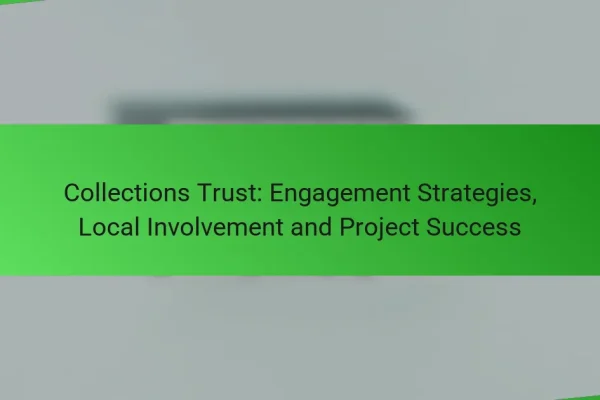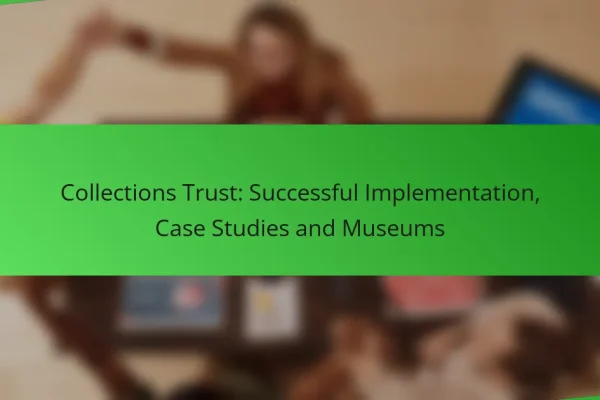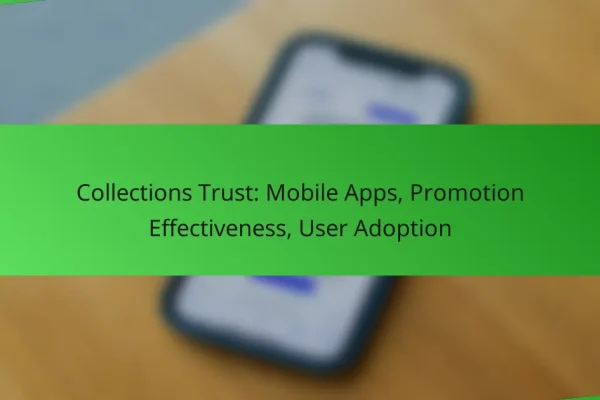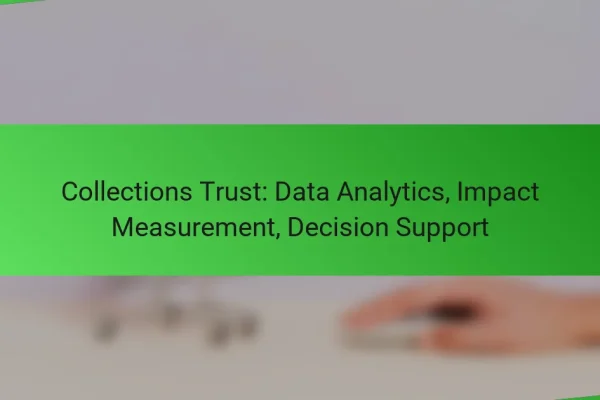
Budgeting: Key Components, Cost Management and Financial Planning
Budgeting is a crucial process that enables individuals and organizations to assess their income and…
Collections Trust is dedicated to improving the management and accessibility of collections across the UK through a variety of services, including training, digital preservation, and funding support. By implementing standardized practices and providing essential resources, they help organizations enhance operational efficiency and stakeholder engagement, ultimately leading to more sustainable collection management.

Budgeting is a crucial process that enables individuals and organizations to assess their income and expenses, ensuring effective financial management. By tracking income, categorizing expenses, and setting clear financial goals, one can create a balanced and sustainable financial plan. Additionally, effective cost management involves identifying areas for expense reduction while maintaining quality, necessitating a strategic…

Assessing the impact of funding in the UK involves a comprehensive evaluation of success metrics, project outcomes, and sustainability. These assessments provide stakeholders with insights into the effectiveness of their investments, highlighting measurable impacts on economic performance, community well-being, and employment rates. Furthermore, sustainability is key in determining how projects can maintain their benefits over…

The Collections Trust in the UK employs effective engagement strategies to enhance local involvement and drive project success. By fostering community connections, collaborating with local artists, and leveraging social media, these initiatives ensure alignment with local needs and values. Measuring success through clear objectives and community feedback further solidifies the impact of these efforts. What…

The implementation of Collections Trust in UK museums provides a strategic framework for effective collection management, ensuring accessibility and preservation. By adhering to best practices, museums can enhance public engagement, improve operational efficiency, and unlock better funding opportunities. Successful case studies illustrate innovative strategies that can serve as models for other institutions aiming to optimize…

Collections Trust offers two primary management solutions: cloud-based systems and on-premise management. Cloud solutions provide flexibility and accessibility for managing collections data remotely, while on-premise management offers enhanced control over security and customization at the cost of higher initial investments. Understanding the cost implications of each approach is essential for organizations to choose the best…

Public and private funding each offer unique advantages and challenges that can significantly impact project outcomes. While public funding provides access to larger capital pools and government support, it often comes with complex application processes and stringent compliance requirements. In contrast, private funding allows for quicker access to capital and greater flexibility, making it appealing…

Blockchain technology revolutionizes the management of collections by ensuring data integrity and security through its unique features. With immutability and decentralized verification, it provides a transparent and tamper-proof environment for storing information, while robust security measures protect against unauthorized access. By integrating blockchain into their systems, organizations can enhance trust among stakeholders and streamline their…

Mobile apps play a crucial role in enhancing the Collections Trust in the UK by enabling seamless interaction between organizations and their supporters. By providing easy access to donation options and fostering community engagement, these apps boost trust and loyalty among users. Effective promotional strategies, such as leveraging social media and targeted email marketing, can…

Tax benefits play a crucial role in enhancing charitable giving by providing financial incentives that encourage donors to contribute more generously. In the UK, schemes such as Gift Aid, inheritance tax relief, and capital gains tax exemptions are designed to maximize the impact of donations while ensuring compliance with regulations set by the Charity Commission…

Collections Trust enhances data analytics in the UK by providing tools and frameworks that facilitate effective data management and utilization. By focusing on impact measurement and decision support, they empower organizations to make informed choices through comprehensive data insights, ultimately improving program effectiveness and aligning strategic goals. How does Collections Trust support data analytics in…
Collections Trust provides a range of services aimed at enhancing the management and accessibility of collections in the UK. These services include collections management, training, digital preservation, funding support, and community engagement initiatives.
Collections management services focus on helping organizations effectively organize, document, and care for their collections. This includes guidance on best practices for cataloging, inventory management, and conservation techniques.
Organizations can benefit from tailored solutions that address their specific needs, ensuring that collections are maintained in accordance with industry standards. Regular assessments and audits can also be part of these services to identify areas for improvement.
Training and consultancy services are designed to empower staff with the skills and knowledge necessary for effective collections management. Workshops and seminars cover various topics, from basic collection care to advanced management strategies.
Consultancy services provide personalized support, helping organizations develop tailored plans that align with their goals. This can include on-site training sessions and ongoing support to ensure staff are confident in their roles.
Digital preservation solutions focus on safeguarding digital assets for the long term. Collections Trust offers strategies for digitizing collections, ensuring that digital files are properly stored and maintained.
These solutions often involve selecting appropriate file formats, establishing backup protocols, and implementing access controls. Organizations are encouraged to create digital preservation policies that outline procedures for managing digital content effectively.
Funding and grant support services assist organizations in identifying and applying for financial resources to enhance their collections. Collections Trust provides guidance on available grants and funding opportunities specific to the UK cultural sector.
Organizations can receive help with proposal writing and budget planning, increasing their chances of securing funding. It's important to stay informed about deadlines and eligibility criteria for various grants.
Community engagement initiatives aim to connect collections with local audiences, fostering a sense of ownership and participation. Collections Trust encourages organizations to develop programs that invite community involvement through events, exhibitions, and educational activities.
These initiatives can enhance public awareness and appreciation of collections, leading to increased visitation and support. Collaborating with local groups and schools can further strengthen community ties and expand outreach efforts.
Collections Trust enhances collection management by providing standardized practices, implementing best practices, and offering access to essential resources and tools. These elements work together to streamline processes, improve efficiency, and ensure that collections are managed effectively and sustainably.
Standardization of practices ensures that all collection management activities follow a consistent framework. This consistency helps organizations maintain quality and compliance, reducing the risk of errors and mismanagement. For example, adopting a unified cataloging system can enhance data accuracy and accessibility across collections.
Organizations can benefit from established standards such as the International Council of Museums (ICOM) guidelines, which provide a foundation for best practices in collection management. By aligning with these standards, institutions can improve their operations and facilitate better collaboration with other organizations.
Implementing best practices in collection management involves adopting proven strategies that enhance efficiency and effectiveness. This can include regular training for staff on the latest techniques in preservation, documentation, and digital management. For instance, using digital tools for inventory management can significantly reduce time spent on manual processes.
Organizations should regularly review and update their practices to incorporate new technologies and methodologies. This proactive approach not only improves current operations but also prepares institutions for future challenges in collection management.
Access to resources and tools is crucial for effective collection management. Collections Trust provides various resources, including guidelines, templates, and software recommendations, that help organizations streamline their processes. Utilizing these tools can lead to improved organization and tracking of collections.
Institutions should take advantage of available online platforms and communities that offer shared resources. Engaging with these networks can provide valuable insights and support, helping organizations stay informed about the latest trends and technologies in collection management.
Working with Collections Trust offers numerous advantages, including enhanced operational efficiency, increased funding opportunities, and improved stakeholder engagement. These benefits can significantly impact the effectiveness and sustainability of organizations managing collections.
Collections Trust helps organizations streamline their processes, reducing time and resource waste. By implementing best practices and standardized procedures, organizations can improve their workflow and productivity.
For example, adopting digital tools for inventory management can cut down on manual errors and speed up data retrieval. Organizations often see a reduction in operational costs by 20-30% when they optimize their processes through Collections Trust's guidance.
Partnering with Collections Trust can open doors to various funding sources, including grants and sponsorships. By aligning with recognized standards and practices, organizations enhance their credibility, making them more attractive to potential funders.
Organizations can leverage Collections Trust's network to identify and apply for funding opportunities that suit their specific needs. This proactive approach can lead to securing additional financial resources, which are crucial for growth and expansion.
Engaging stakeholders effectively is vital for the success of any organization. Collections Trust provides tools and strategies to foster better communication and collaboration with stakeholders, including donors, community members, and partners.
By utilizing stakeholder feedback and involving them in decision-making processes, organizations can build stronger relationships and enhance their community presence. Regular updates and transparent communication can increase stakeholder trust and support, leading to more successful initiatives.
To engage with Collections Trust, organizations typically need to demonstrate a commitment to best practices in collections management and adhere to specific standards. This often includes having a clear mission, adequate resources, and a willingness to collaborate with other institutions.
Membership in Collections Trust requires organizations to have a defined collections policy and a management structure that supports collections care. Additionally, members should be actively involved in the sector and committed to continuous improvement in their practices.
Organizations must also provide evidence of their collections management practices, which may include documentation of their collections, conservation efforts, and public engagement strategies. This helps ensure that all members are aligned with the Trust's goals.
The application process for Collections Trust typically begins with an online submission where organizations outline their qualifications and intent. This is followed by a review period during which the Trust evaluates the application against its membership criteria.
Once approved, organizations may need to pay a membership fee, which can vary based on the size and type of the institution. After joining, members can access resources, training, and networking opportunities to enhance their collections management practices.
Collections Trust supports digital transformation by providing resources and guidance tailored to the needs of cultural heritage organizations. Their approach includes advisory services and workshops that equip institutions with the necessary tools and strategies to effectively implement digital solutions.
Collections Trust offers advisory services that help organizations select and implement digital tools suited to their specific needs. This includes evaluating existing systems, identifying gaps, and recommending software solutions that enhance collection management and accessibility.
For example, they may assist in choosing a collections management system that aligns with an institution's size and budget, ensuring that the selected tool can scale as the organization grows. Institutions should consider factors like user-friendliness, integration capabilities, and support services when making decisions.
Workshops provided by Collections Trust focus on developing effective digital strategies tailored to the unique challenges faced by cultural institutions. These sessions cover a range of topics, from digital preservation to audience engagement through online platforms.
Participants can expect to learn practical skills, such as how to create a digital strategy roadmap or how to leverage social media for outreach. Engaging in these workshops can help organizations avoid common pitfalls, such as underestimating the resources required for successful digital initiatives.
Emerging trends in collections management focus on leveraging technology, promoting sustainability, and enhancing community engagement. These trends are reshaping how collections are curated, maintained, and shared with the public.
The integration of AI technologies in collections management is transforming data analysis and operational efficiency. AI can automate routine tasks, such as cataloging and inventory management, allowing staff to focus on more strategic initiatives.
For example, machine learning algorithms can analyze visitor data to predict trends and improve exhibit planning. Organizations should consider investing in AI tools that align with their specific needs and capabilities, ensuring a smooth transition and effective implementation.
Sustainability practices are becoming a priority in collections management, with institutions seeking to reduce their environmental impact. This includes using eco-friendly materials for exhibits and implementing energy-efficient systems in storage and display areas.
Organizations can adopt practices such as digital cataloging to minimize paper use and sourcing sustainable products for their operations. Engaging with local suppliers and communities can also enhance sustainability efforts while fostering regional economic growth.
Increased emphasis on community involvement is reshaping how collections are developed and presented. Institutions are recognizing the value of engaging local audiences in decision-making processes, which can lead to more relevant and inclusive collections.
Strategies for enhancing community involvement include hosting workshops, soliciting feedback through surveys, and collaborating with local artists and historians. By prioritizing community input, organizations can create collections that resonate more deeply with their audiences and reflect diverse perspectives.